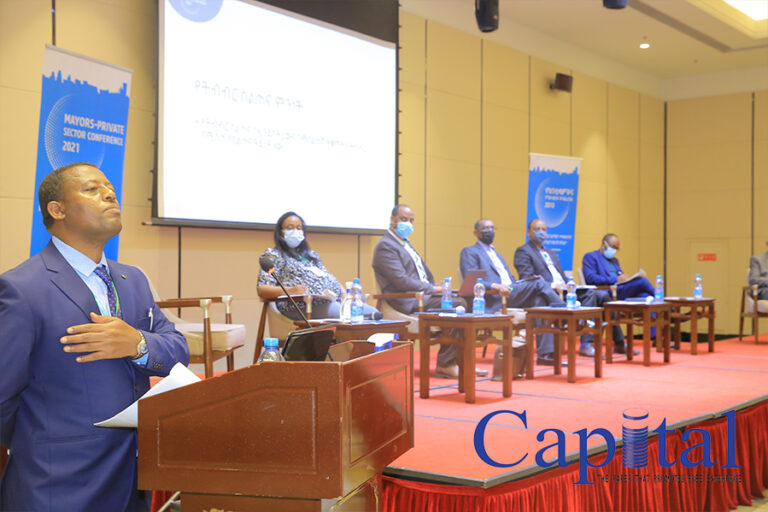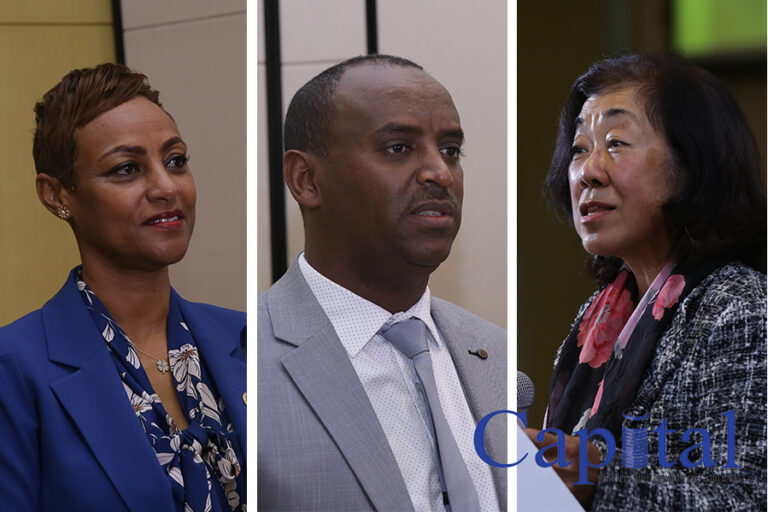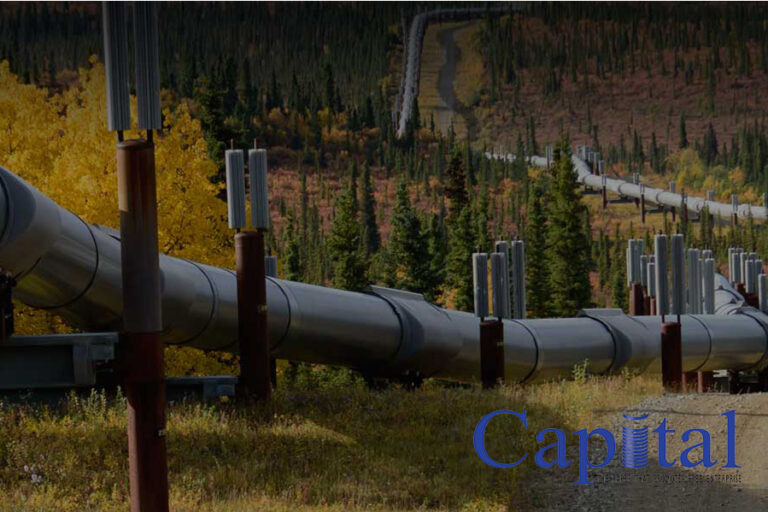The first Mayors private sector conference has been held at Skylight Hotel in Addis Ababa from May 6 to 7, 2021.
Being the first of its kind, the conference was organized by the Ministry of Urban Development and Housing, Ethiopian Chamber of Commerce And Sectorial Association /ECCSA/, Ministry of Trade and Industry, Job Creation Commission, Ethiopian Cities Association, Pan African Chamber of Commerce and Industry. The conference was sponsored by the embassy of Sweden to accelerate the relation between cities and private business sector. The program is set to mark an important milestone in the roadmap towards the development of public private partnership, entrepreneurship and job creation as well.
More than 60 mayors, 70 business community, 20 businesses prominent have been participating on the conference. Panel desiccation, presentation, experience sharing was held during the interactive sessions.
The conference focuses on five thematic areas; job creation, business development, sustainable growth, urban revenue and going global.
Getachew Melkamu, program officer at Pan African Chamber of Commerce and Industry and organizer of the session expressed that three outcomes are expected form the conference. “The conference allows cities to share experiences regarding business, helps to create network between cities and to build long term partnership with the private sector,” explained Getachew.
Trainings, apprenticeship and internship, key challenges and good practice in cities, changing mindset towards entrepreneurship, schemes and sources of financing and financing modalities, preserving cities while growing them, leveraging cities potential for other growth were the target areas of the conference.
The conference is expected to continue holding annually conferences as a flagship project of the ECCSA.
Mayors, private sector congregate to uplift municipalities
World Press Freedom Day
World Press Freedom Day was marked on Tuesday May 4th in Addis Ababa under the theme “Information as a Public Good.”
During the occasion, Representative of the House of People’s Representative Speaker, Tagesse Chafo said the government has introduced reforms in media freedom and provided capacity building training for journalists to enable them provide accurate and timely information to the public and contribute their part in peace building.
He urged the media and journalists to actively engage in peace building and disseminate information that advance public interests.
Ethiopian Media Council General Assembly Chairperson, Teguest Yilma said World Press Freedom Day is marked to give due attention to the essential role of free and professional journalists in producing and disseminating information by tackling misinformation and other harmful contents.
“It is also aimed at urging journalists to provide exact and relevant information to the public by respecting professional ethics of journalism,” she added.
According to her, misinformation and fake news are the challenging phenomena in the media sector that need to be given due attention while reporting events and range of issues.
UNESCO Addis Ababa Office Director, Yumiko Yokozeki on her part reiterated the urgent attention that needs to be given to misinformation and hate speech.
She pointed out that the media and journalists should fight against these challenges by providing relevant and exact information to the public.
Yokozeki appreciated the ongoing reforms by the Government of Ethiopia in advancing access to information to media.
Underscoring the commitment of UNESCO towards working closely with stakeholders to ensure the safety of journalists, media freedom, transparency, respect of human rights and information literacy, she called on everyone to show commitment to ensuring the fundamental right of freedom of expression.
Ethiopian Media Authority Director-General, Mohammed Idris also called on the media and journalists to provide accurate and balanced information, free from hate speech and emotion. “Information should not be used to destabilize the integrity of the country,” he stressed.
Media representatives, officials and invited guests attended the ceremony.
Foreign currency shortage backtracks’ ESLSE
Ethiopian Shipping and Logistics Services Enterprise (ESLSE) claims that it is unable to access its own foreign currency prompt from local banks.
The state logistics giant that solely operates vessels in Ethiopia said that despite having huge amounts of foreign currency in banks it is unable to access it duly when it demands to settle service charges.
The enterprise mainly working with ports in Djibouti said that it has accrued sums that are supposed to be paid for the port service.
Roba Megersa, CEO of ESLSE, few weeks ago told Capital that the credit that ESLSE was supposed to pay to the port related services has faced delays because of the foreign currency crunch.
He said that his enterprise has ample resources at banks even in foreign currency but it is unable to access when it needs.
“We have USD 92 million that is deposited in banks but we are unable to access it when we want,” he explains. “We cannot access our own foreign currency from private banks that we deposited,” Roba said reminding why delays have occurred on payments that are due as a result the foreign currency shortage.
According to the CEO, through whole this challenge there is no cargo delay at Djibouti ports because of service payment hold up from the Ethiopian side.
“We have huge credits that are supposed to be paid to the port service, we are working with our Djibouti partners on mutual benefit and trust that has been built for several years. The operation at the port is gone under guarantee framework and undertaking. We are transporting fertilizer, wheat or other cargos that are transported from ports under the stated arrangement without any delay,” Roba added.
Besides port charge settlement the enterprise is affected by delay on foreign currency for the procurements of products that it demanded to add on its operation.
For instance ESLSE has established a project office for the building of two ultramax vessels that have a capacity of 65,000 DWT, while the hard currency issue has concerned the enterprise.
Currently, ESLSE manages the shipment of coal and fertilizer up to 70,000 tons on chartered vessels due to that the ultramax vessels are more economically viable to accommodate its consignment.
“If we get the finance it will be done within two years,” the CEO said. The two vessels may cost USD 70 million.
The flag carrier, ESLSE, is one of the oldest cross continent vessel operators in the world since it managed the first vessels in March 1964 and now the only in Africa.
Currently, it is mainly manages 11 dry cargo ships. From the stated, two vessels are tankers and the nine are general cargo vessels called ‘Handysize’ with the capacity of 28, 000 DWT.
Ethiopia loads its cargos from 340 ports in the world and ESLSE has agents that have been working for several decades.
A mega oil way under works
The idea to build a pipeline for refined petrol looks to get revamped in the ten year development plan of the Ministry of Transport (MoT).
At least 925 kilometer of oil way might be constructed in the ten year period.
It is to be recalled that the idea to construct the pipeline stems almost a decade back, which up to now has not borne fruit. However, there was a promise of interest from companies in the US, Asia and others who sought to realize the pipeline not only between the ports in Djibouti to Ethiopia but also up to South Sudan oil fields.
Companies like Black Rhino and Toyota Corp have been mentioned as possible firms that were to connect the three countries through the oil pipeline for both crude and refined.
On the flip side the project that targets to connect Djibouti to Awash National depot, 226km east of Addis Ababa seems to be feasible.
About six years ago, the Ethiopian and Djibouti Governments had signed a framework agreement with the Black Rhino Group and Royal Bafokeng Holdings, owned by a US private equity group Blackstone for the construction of the multi-product fuel pipeline that stretches 550km in to Awash.
However, the project was not realized and the Ethiopian government at the time also seemed to be focusing on the development of the electrified railway that connects the ports in Djibouti to central Ethiopia to transport oil on fuel tanker wagons.
Despite the railway line commencing operation in 2018 so far oil has not been transported on it. Nonetheless, the project that connects Awash to that main line has commenced recently.
Through all this, MoT has now expressed its desire to see a petrol pipeline in the ten year development plan. According to sources, the government is highly eager to see the infrastructure in the first five years period from the ten years plan.
On the latest transport and logistics investment potentials summit that organized to invite interested local and global actors to invest on the stated sector, MoT has included the pipeline development as one of the 44 projects that shall be developed on public private partnership, joint venture or full investment.
While the document distributed on the summit did not give details, it expressed that the main objective of the project is to construct a pipeline as an alternative mode of transport for oil and gas cargos.
The ministry added that pipeline transport, which is less costly, is used to transport petrol and relevant liquid products. It is important to install a petroleum carrying pipeline from the sea port to inland destinations that will particularly lower the cost of procuring and operating fuel transporting vehicles.
“Pipeline transport is highly profitable and environmentally friendly having sustainable economic and environmental contribution. Constructing and operating pipeline transport infrastructure and services requires feasibility study and preparation of a standard,” it highlighted, adding, “Therefore, taking its potential contribution to the overall economy into account, pipeline transport is used as a basis for policy formulation.”
On its ten year development plan document, MoT said that it has a plan to see at least 925km pipeline by 2030 to transport refined petrol. Meanwhile, details were not revealed. On the other hand, the document disbursed at the summit stated on its description for pipeline project that there are potential cross border pipeline projects connecting Ethiopia with the neighbors. “Pipeline with connection with Sudan, Kenya, South Sudan, Eritrea and Djibouti is envisaged. The exact project location will be determined based in a feasibility study of the specific project,” it says, “For the most part; the pipelined will be underground to minimize disruption for in use and wildlife.”
The demand of Ethiopian oil is aligned with the economic growth for instance since the global pandemic occurrence about a year ago the demand has slightly declined but on average it is growing by 10 percent every year.
During the first quarter of 2020/21, the volume of petroleum products imported amounted to 878.7 thousand metric tons, which was 13 percent lower than last year owing to slow down in importation of all types of petroleum products.






